2015年对赴美访问学者J1英语要求,美国教育部
- 格式:docx
- 大小:15.93 KB
- 文档页数:2
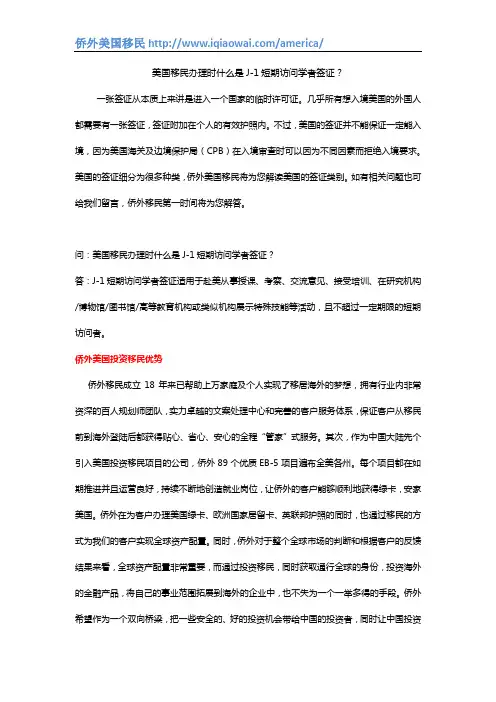
美国移民办理时什么是J-1短期访问学者签证?一张签证从本质上来讲是进入一个国家的临时许可证。
几乎所有想入境美国的外国人都需要有一张签证,签证附加在个人的有效护照内。
不过,美国的签证并不能保证一定能入境,因为美国海关及边境保护局(CPB)在入境审查时可以因为不同因素而拒绝入境要求。
美国的签证细分为很多种类,侨外美国移民将为您解读美国的签证类别。
如有相关问题也可给我们留言,侨外移民第一时间将为您解答。
问:美国移民办理时什么是J-1短期访问学者签证?答:J-1短期访问学者签证适用于赴美从事授课、考察、交流意见、接受培训、在研究机构/博物馆/图书馆/高等教育机构或类似机构展示特殊技能等活动,且不超过一定期限的短期访问者。
侨外美国投资移民优势侨外移民成立18年来已帮助上万家庭及个人实现了移居海外的梦想,拥有行业内非常资深的百人规划师团队,实力卓越的文案处理中心和完善的客户服务体系,保证客户从移民前到海外登陆后都获得贴心、省心、安心的全程“管家”式服务。
其次,作为中国大陆先个引入美国投资移民项目的公司,侨外89个优质EB-5项目遍布全美各州。
每个项目都在如期推进并且运营良好,持续不断地创造就业岗位,让侨外的客户能够顺利地获得绿卡,安家美国。
侨外在为客户办理美国绿卡、欧洲国家居留卡、英联邦护照的同时,也通过移民的方式为我们的客户实现全球资产配置。
同时,侨外对于整个全球市场的判断和根据客户的反馈结果来看,全球资产配置非常重要,而通过投资移民,同时获取通行全球的身份,投资海外的金融产品,将自己的事业范围拓展到海外的企业中,也不失为一个一举多得的手段。
侨外希望作为一个双向桥梁,把一些安全的、好的投资机会带给中国的投资者,同时让中国投资者的资金可以在国际市场上发挥更重要的作用。
作为侨外非常重要的美国投资移民项目,在中国的市场占有率为1/3,全球市场占比为17%,处于行业靠前的地位。
在这13年中,侨外美国投资移民项目的I-526和I-829获批成功率一直保持高记录,总共的申请量超过10000个家庭,侨外在今年收到了第26批全额还款,接下来的几个月还将有几个项目按期甚至提前还款。
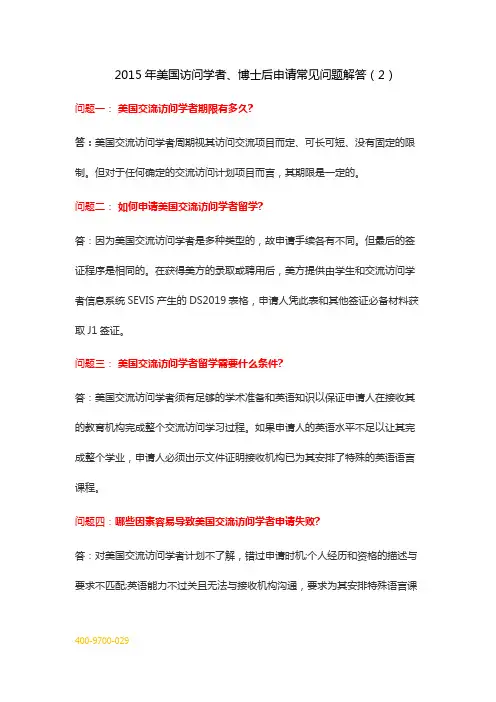
2015年美国访问学者、博士后申请常见问题解答(2)
问题一:美国交流访问学者期限有多久?
答:美国交流访问学者周期视其访问交流项目而定、可长可短、没有固定的限制。
但对于任何确定的交流访问计划项目而言,其期限是一定的。
问题二:如何申请美国交流访问学者留学?
答:因为美国交流访问学者是多种类型的,故申请手续各有不同。
但最后的签证程序是相同的。
在获得美方的录取或聘用后,美方提供由学生和交流访问学者信息系统SEVIS产生的DS2019表格,申请人凭此表和其他签证必备材料获取J1签证。
问题三:美国交流访问学者留学需要什么条件?
答:美国交流访问学者须有足够的学术准备和英语知识以保证申请人在接收其的教育机构完成整个交流访问学习过程。
如果申请人的英语水平不足以让其完成整个学业,申请人必须出示文件证明接收机构已为其安排了特殊的英语语言课程。
问题四:哪些因素容易导致美国交流访问学者申请失败?
答:对美国交流访问学者计划不了解,错过申请时机;个人经历和资格的描述与要求不匹配;英语能力不过关且无法与接收机构沟通,要求为其安排特殊语言课
程;申请材料准备不规范;不能与接收机构取得直接联系,澄清相关细节问题等都会导致申请失败。
问题五:目前有哪家机构可以助申请者一臂之力取得成功?
答:金东方通过在美国的海外留学顾问及时与接收机构取得直接联系,把握申请时机;了解接收机构具体需求,为申请者有的放矢地规划咨询,助其选择对口的申请对象;聘请精通英文并熟悉专业的人士审改其申请材料,确保申请材料的规范性和准确性;成为接收机构和申请者之间的桥梁,及时沟通,澄清相关细节问题。
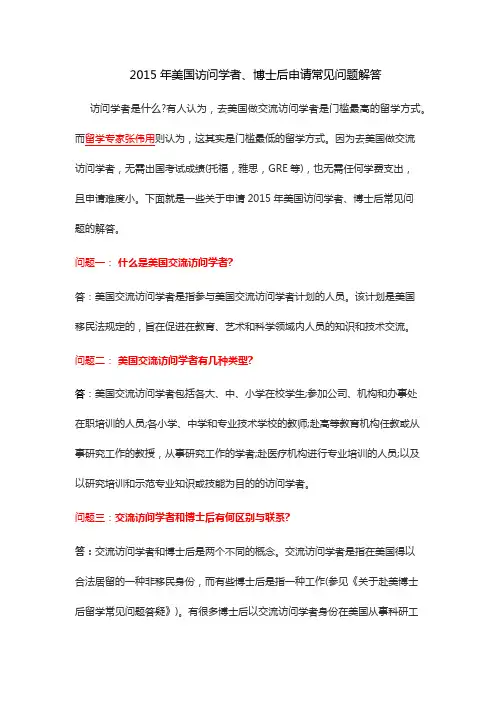
2015年美国访问学者、博士后申请常见问题解答访问学者是什么?有人认为,去美国做交流访问学者是门槛最高的留学方式。
而留学专家张伟用则认为,这其实是门槛最低的留学方式。
因为去美国做交流访问学者,无需出国考试成绩(托福,雅思,GRE等),也无需任何学费支出,且申请难度小。
下面就是一些关于申请2015年美国访问学者、博士后常见问题的解答。
问题一:什么是美国交流访问学者?答:美国交流访问学者是指参与美国交流访问学者计划的人员。
该计划是美国移民法规定的,旨在促进在教育、艺术和科学领域内人员的知识和技术交流。
问题二:美国交流访问学者有几种类型?答:美国交流访问学者包括各大、中、小学在校学生;参加公司、机构和办事处在职培训的人员;各小学、中学和专业技术学校的教师;赴高等教育机构任教或从事研究工作的教授,从事研究工作的学者;赴医疗机构进行专业培训的人员;以及以研究培训和示范专业知识或技能为目的的访问学者。
问题三:交流访问学者和博士后有何区别与联系?答:交流访问学者和博士后是两个不同的概念。
交流访问学者是指在美国得以合法居留的一种非移民身份,而有些博士后是指一种工作(参见《关于赴美博士后留学常见问题答疑》)。
有很多博士后以交流访问学者身份在美国从事科研工作和专业培训,故有些人误将两者等同起来。
其实,有很多交流访问学者并不从事博士后工作,也有不少博士后以其他身份(如持H1-B工作签证的特殊职业工作人员)在美国留学。
问题四:交流访问学者和本科或研究生留学有何区别与联系?答:交流访问学者是指在美国得以合法居留的一种非移民身份,有些本科或研究生以交流访问学者身份在美国留学。
他们与其他留学生不同的地方在于他们持访问学者J1签证而不是F1学生签证。
问题五:在经济上如何负担美国交流访问学者留学?答:因为美国交流访问学者是多种类型的,资金来源也各有不同,诸如国内外政府机关或民间非营利组织颁发的奖学金或助学金、工商企业的赞助、国际基金组织的资助、美国用人单位提供的工资津贴与科研经费、以及个人和家庭的经济实力等都可用于负担在美国交流访问学者留学之需。

J1签证需要的材料到美国做访问学者的一般程序(交流访问学者)1. 需要准备的材料1.1. DS-2019表由资助人提供给申请人,上面注有在美留学期限、费用数额和来源以及其他有关的事项。
1.2. DS-156非移民签证申请表在这个网址可找到美国驻上海总领事馆的网站/shanghai要求:在线填写(用英文);点击“continue”按钮,生成pdf 文件。
保存后打印(3页,不用正反面,含条形码);打印完后第6, 7, 8, 9, 15, 18 和20项手填相应的中文信息。
在填写第6,7项时必须提供全名的中文电码。
1.3. DS-157非移民签证补充信息表1.4. DS-158非移民签证申请人联系方式及工作经历调查表1.5. 有效护照1.6. 2张照片尺寸为2×2英寸(大约为50毫米×50毫米)正方形,白底无边框。
照片背面无花纹。
1.7. 签证申请费收据中信的收据是签证费(交当地中信银行,约800rmb);SEVIS费(需填写I-901表,100美元,信用卡支付),备好DS02019表,网址https:///index.jhtml。
1.8. 其他补充材料简历;邀请信;给签证官的信(表明无移民倾向,research plan,return plan等);学位证和毕业证;推荐信;发表文章;获奖证书;毕业论文;参加国外学术团体的证明材料等。
注意:1.1-1.7的材料交签证厅里的窗口,“其他补充材料”交签证官(VO)2. 签证流程2.1. 预约2.2. 过程领事馆外武警检查身份证和护照问清排队时间段到一窗口(领护照的窗口?)查看DS156表、身份证和护照、缴费收据过关就会收取身份证并递交给两米外的其他工作者拿好材料,等候安全检测等工作者拿身份证叫你进门就是测体温,额头对到探头就行。
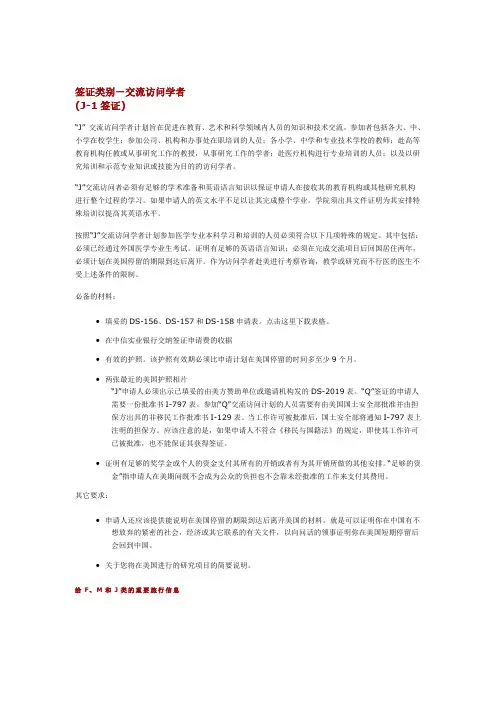
签证类别-交流访问学者(J-1签证)“J” 交流访问学者计划旨在促进在教育、艺术和科学领域内人员的知识和技术交流。
参加者包括各大、中、小学在校学生;参加公司、机构和办事处在职培训的人员;各小学、中学和专业技术学校的教师;赴高等教育机构任教或从事研究工作的教授,从事研究工作的学者;赴医疗机构进行专业培训的人员;以及以研究培训和示范专业知识或技能为目的的访问学者。
“J”交流访问者必须有足够的学术准备和英语语言知识以保证申请人在接收其的教育机构或其他研究机构进行整个过程的学习。
如果申请人的英文水平不足以让其完成整个学业。
学院须出具文件证明为其安排特殊培训以提高其英语水平。
按照“J”交流访问学者计划参加医学专业本科学习和培训的人员必须符合以下几项特殊的规定。
其中包括:必须已经通过外国医学专业生考试。
证明有足够的英语语言知识;必须在完成交流项目后回国居住两年,必须计划在美国停留的期限到达后离开。
作为访问学者赴美进行考察咨询,教学或研究而不行医的医生不受上述条件的限制。
必备的材料:∙填妥的DS-156、DS-157和DS-158申请表。
点击这里下载表格。
∙在中信实业银行交纳签证申请费的收据∙有效的护照。
该护照有效期必须比申请计划在美国停留的时间多至少9个月。
∙两张最近的美国护照相片“J”申请人必须出示已填妥的由美方赞助单位或邀请机构发的DS-2019表。
“Q”签证的申请人需要一份批准书I-797表。
参加“Q”交流访问计划的人员需要有由美国国土安全部批准并由担保方出具的非移民工作批准书I-129表。
当工作许可被批准后,国土安全部将通知I-797表上注明的担保方。
应该注意的是,如果申请人不符合《移民与国籍法》的规定,即使其工作许可已被批准,也不能保证其获得签证。
∙证明有足够的奖学金或个人的资金支付其所有的开销或者有为其开销所做的其他安排。
“足够的资金”指申请人在美期间既不会成为公众的负担也不会靠未经批准的工作来支付其费用。
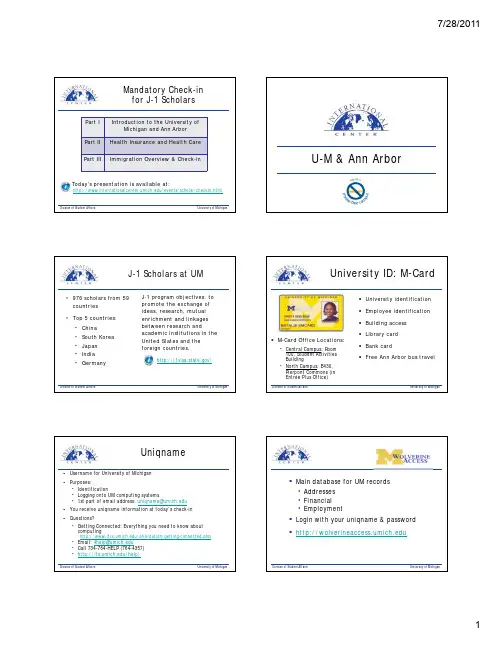
U-M & Ann Arbor TM-Card Office Locations:•Central Campus: RoomUsername for University of MichiganMain database for UM recordsUniversity Housing Office in Student Activities U.S. bank account recommendedCell Phones: Prepaid & Contract/life/license.htmlDivision of Student AffairsUM Blue BusesIn case of an emergency:UM Student OrganizationsSome off-campus options:/life/recreation.html#fitnessWork/Life Resource CenterWorkshop presentations/handouts available at:/events/orientation_events.htmlDivision of Student Affairs•Programming, social events, and support•//events/index.htmlDivision of Student AffairsInternational Center website: Life in Ann Arbor•/life/•UM Postdoctoral Association (PDA)Health Care & InsuranceUniversity of MichiganHealth Care & InsuranceUniversity Health Service (UHS)Health Care & InsuranceFor Family CareFamily Health Service (scholars, spouses, children),Community Family Health Center (scholars, spouses,children) or East Ann Arbor Health Center (children only):per issue.How Insurance Works Coverage HighlightsMedical Evacuation, Repatriation and Travel Assistance CoverageCost (until August 31, 2011) Cost (from 9/1/2011 through 8/31/2012)Click on Campus FinancesHealth Care & Insuranceyour BillHealth Care & InsuranceYour ResponsibilitiesMaintain health insurance for the ENTIRE length of yourprogram.Check your Wolverine Access account and PAY yourQuestions?U.S. Immigration RegulationsDocument ReviewDocument ReviewDocument ReviewVisaDocument ReviewI-94Document ReviewDS-2019CANNOT expireDepartment must requestextensionDocument ReviewDS-2019CANNOT expireDepartment must requestextensionCategory & SubjectField Code Document ReviewDS-2019CANNOT expireDepartment must requestextensionCategory & SubjectField Code212eDocument ReviewUniversity of MichiganImmigration Documents:They are important!Store your immigration documents in a secure Keep photocopies of all of your documents in a separate place from the originals.Never throw away any old immigrationdocuments. You may need them in the future.Domestic travel: carry original documentsUniversity of MichiganSocial Security Number(SSN)are eligible for SSNYou’re SSN letter is attached to your temporary proof of health insurancecan apply for work authorizationThey will be eligible for SNN once work authorization apply for SSN until you have been in the U.S. for 10 days or 4 days after this check-in, whichever is later .Address Notification Guidelines:Put in your red plastic folder:Scholar Responsibility Checklist I NTERNATIONAL C ENTER603E.M ADISON S T.A NN A RBOR,MI48109-1370734.764.9310FAX:734.647.2181 icenter@As an international scholar, you have an obligation to comply with the immigration laws and regulations of the United States. It is illegal to violate U.S. federal immigration laws and regulations for any reason whatsoever. As an exchange visitor with J-1 status, you are responsible for learning, understanding, and complying with the U.S. laws and regulations that apply to you. Your failure to be aware of and comply with these requirements could jeopardize your stay in the United States.You need to remember the following:Report address changes, through Wolverine Access, within 10 days of any change in your U.S. or home country address.Keep your passport valid.Always have a valid DS-2019. Extensions may be requested by your sponsoring department.Obtain a travel signature as needed.Inform the International Center (IC) if you end or leave your program before your DS-2019 expires.Abide by employment regulations. Meet with an International Student and Scholar Advisor (ISSA) to obtain authorization before engaging in any activity for which you will receive payment from aninstitution other than the University of Michigan.Check your University of Michigan e-mail regularly for updates from the International Center and read IC e-mails carefully. Follow up as necessary.Make an appointment with an International Center advisor for any questions you may have regarding your immigration status or regulations.Maintain health insurance at all times. Health insurance must meet U of M standards.I have read and understand this information, and knowingly accept full responsibility for maintaining my status as an international student during the duration of my studies at the University of Michigan.J-1 VISITING SCHOLAR & PROFESSORS: IMPORTANT IMMIGRATION INFORMATION The general purpose of the Exchange Visitor Program is to promote international educational and cultural exchange to develop mutual understanding between the people of the U.S. and other countries. At U-M, there are three types of J-1 exchange visitors: students, visiting scholars, and visiting professors. An exchange visitor must not be a candidate for a tenure-track position.J-1 visiting research scholars primarily conduct research, observe, or consult in connection with a research project. The visiting scholar may also teach or lecture.J-1 visiting professors primarily teach, lecture, observe, or consult. The visiting professor may also conduct research.J-1 visiting short term scholars can be professors, research scholars, specialists, or persons with similar education or accomplishments coming to the U.S. on a short-term visit for the purpose of lecturing, observing, consulting, training, or demonstrating special skills.J-1 specialists are individuals who are expert in a field of specialized knowledge or skill who come to the U.S. for observing, consulting or demonstrating those special skills.Maintaining Legal J-1 StatusAs a J-1 exchange visitor, you must meet certain obligations to maintain legal immigration status. Maintaining status is necessary to receive the benefits of J-1 status in the future, such as applying for a change of status, if needed. Failure to maintain your non-immigrant status can result in serious problems with immigration and could lead to deportation from the U.S. To maintain legal J-1 status, a J-1 visiting scholar or professor must:Attend the mandatory immigration check-in program at the U-M International Center.Have a valid DS-2019. Extensions can be completed with your J-1 sponsor.Have a valid passport. The passport must be valid for at least 6 months into the future on the day you return from your trip abroad.Conduct employment only as indicated on the DS-2019.NOTE:Departments must contact the U-M International Center if they would like the exchange visitor to engage incollaborative work outside of U-M or if the exchange visitor wishes to participate in occasional lectures at another institution. File timely and appropriate transfer and extension notification to the Exchange Visitor Program (EVP) through the sponsoring agency.Maintain required health insurance coverage.Update your current and permanent address information at within 10 days of moving.Health Insurance RequirementAll exchange visitors and their accompanying dependents at the University of Michigan are required to have health insurance coverage that meets the University's standards for the entire duration of your J-1 program. You will be enrolled in an approved insurance program at the mandatory immigration check-in program. If your government or program sponsor is providing you with health insurance, you will later have the opportunity to apply for a waiver of the mandatory health insurance. In order for a waiver to be granted, your health insurance coverage must be proven to meet U-M standards, so please bring a copy of the insurance policy with you to the U.S. Health insurance is not an option - it is a requirement.Travel Outside the U.S. and ReentryWhen traveling outside the United States, you will need to have the proper documents to return. You may need a valid J-1 visa (the visa stamp in your passport.) Reentry from Canada, Mexico, and the adjacent islands may be allowed with an expired visa. In addition, you will need a DS-2019 with a travel signature from a Responsible Officer or an Alternate Responsible Officer at the U-M International Center. The signature is valid for one year (or to the end date of your current DS-2019, whichever is sooner) following the signature date.If you are visiting Canada, you may need to apply for a visitor visa to enter Canada. The closest Canadian consulate is located in Detroit.For more information, consult our Travel Advisory at the International Center website.Two-Year Foreign Residency Requirement (212[e])Under specific circumstances, a J-1 exchange visitor may incur a Two-Year Foreign Residency Requirement. The J-2 dependents are subject to this same requirement if the J-1 visa holder is subject to the requirement. This means that neither the J-1 nor the J-2 may change immigration status to H, L, or Permanent Residency without first returning to his/her country for two years or obtaining a waiver of this requirement. If the Two-Year Foreign Residency Requirement applies, change of status to another non-immigrant classification, such as F-1, in the U.S. is prohibited. If the individual is subject to this requirement, the J-1 visa stamp or DS-2019 form will indicated that the bearer is subject to “212(e)”.For more information about 212(e), refer to Two-Year Foreign Residency Requirement and Waiver at the International Center website or to the U.S. Department of State web site at /visa/temp/types/types_1267.html.Twenty-four month bar on repeat participation [22 CFR § 62.20(i)(2)]A professor or research scholar who completes or has completed a J-1 program of five years or less on or after November 18, 2006, is not eligible for repeat participation as a professor or research scholar for a period of twenty-four months following the J-1 program end date (DS-2019 end date) as recorded in the Student Exchange Visitor Information system (SEVIS).Twelve-month bar after previous J participation [22 CFR § 62.20(d)(ii)]Time spent in the U.S. in another J status may affect an alien’s eligibility for participation as a “professor” or “research scholar.” An individual is not eligible to “begin a new program” if he/she was physically present in any J status (including J-2 status) for 6 months or more during the immediately preceding 12months from the date of program commencement set forth on the new Form DS-2019, unless: 1) the participant is transferring to U-M Exchange Visitor Program in the same category; or 2) the participant’s presence in the U.S. was pursuant to a “Short-term scholar” exchange activity.EmploymentJ-1 visiting scholars and professors are eligible to work as described on the DS-2019 and may potentially accept additional employment as authorized by the U-M International Center in accordance with regulations.J-1 Visiting Scholars and ProfessorsIn addition to employment at the University of Michigan, J-1 visiting scholars and professors are only eligible to be authorized for incidental employment, such as providing occasional lectures or consulting. Incidental employment must be approved by U-M International Center prior to the activity. For more information, refer to Incidental Employment for J-1 Visiting Scholars and Professors atDependentsDependents are defined as a spouse and minor children (under age 21) of the J-1 exchange visitor. Dependent spouses and children enter the U.S. on J-2 dependent visas. Each dependent is required to have an individual DS-2019 to obtain a J-2 visa stamp from a U.S. embassy or consulate and to enter the U.S. (Canadians are exempt from the visa requirement). For more information, refer to the International Center website.Having J-2 status does not enable a J-2 dependent to work, but it gives the person the ability to apply for permission to work from the U.S. Citizenship and Immigration Services (USCIS) office through an Employment Authorization Document (EAD) (Form I-766). The J-2 dependent does not have legal permission to work until the EAD is approved by USCIS. For more information, refer to J-2 Dependent Employment Authorization Document page at the International Center website.TaxesAll J-1 exchange visitors must file federal tax forms every year that they are in the U.S. The deadlines to file the forms are April 15, if U.S. money is earned, and June 15, if no U.S. money is earned. For more information, refer to Taxes and Social Security section of the International Center website.Grace PeriodWhen a J-1 exchange visitor completed his or her program, a 30-day grace period begins. During these 30 days he/she may remain in the U.S. and prepare to leave. It is not permissible to work during the grace period. Nor may one exit the U.S. and reenter as a J-1 during the grace period.Department of State Exchange Visitor ProgramThe J-1 Exchange Visitor Program is administered by the Office of Exchange Coordination and Designation, in the Bureau of Educational and Cultural Affairs of United States Department of State. Our J-1 Program is overseen by the Academic and Government Division.Office of Exchange Coordination and DesignationECA/EC/AG - SA-44, Room 732301 4th Street, S.W.Washington, D.C. 20547202.203.5029Jvisas@Note: This is a brief overview only. Because of the complexity of immigration regulations, it is advisable to consult with an International Student and Scholar Advisor (ISSA) at the International Center for details.。
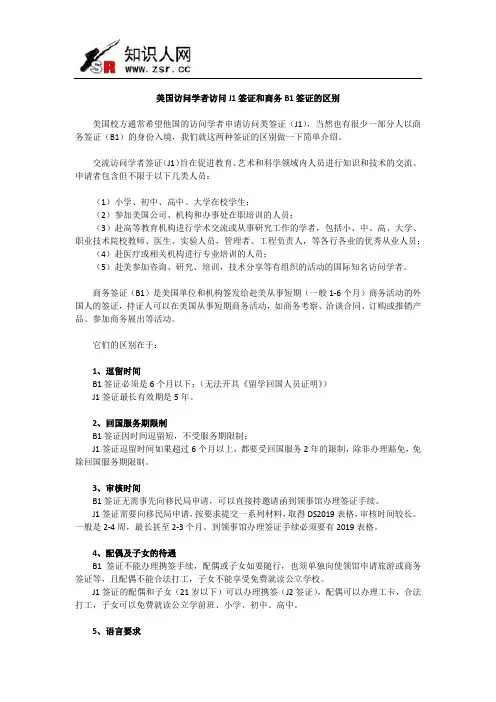
美国访问学者访问J1签证和商务B1签证的区别美国校方通常希望他国的访问学者申请访问类签证(J1),当然也有很少一部分人以商务签证(B1)的身份入境,我们就这两种签证的区别做一下简单介绍。
交流访问学者签证(J1)旨在促进教育、艺术和科学领域内人员进行知识和技术的交流。
申请者包含但不限于以下几类人员:(1)小学、初中、高中、大学在校学生;(2)参加美国公司、机构和办事处在职培训的人员;(3)赴高等教育机构进行学术交流或从事研究工作的学者,包括小、中、高、大学、职业技术院校教师、医生、实验人员,管理者、工程负责人,等各行各业的优秀从业人员;(4)赴医疗或相关机构进行专业培训的人员;(5)赴美参加咨询、研究、培训,技术分享等有组织的活动的国际知名访问学者。
商务签证(B1)是美国单位和机构签发给赴美从事短期(一般1-6个月)商务活动的外国人的签证,持证人可以在美国从事短期商务活动,如商务考察、洽谈合同、订购或推销产品、参加商务展出等活动。
它们的区别在于:1、逗留时间B1签证必须是6个月以下;(无法开具《留学回国人员证明》)J1签证最长有效期是5年。
2、回国服务期限制B1签证因时间逗留短,不受服务期限制;J1签证逗留时间如果超过6个月以上,都要受回国服务2年的限制,除非办理豁免,免除回国服务期限制。
3、审核时间B1签证无需事先向移民局申请,可以直接持邀请函到领事馆办理签证手续。
J1签证需要向移民局申请,按要求提交一系列材料,取得DS2019表格,审核时间较长。
一般是2-4周,最长甚至2-3个月。
到领事馆办理签证手续必须要有2019表格。
4、配偶及子女的待遇B1签证不能办理携签手续,配偶或子女如要随行,也须单独向使领馆申请旅游或商务签证等,且配偶不能合法打工,子女不能享受免费就读公立学校。
J1签证的配偶和子女(21岁以下)可以办理携签(J2签证),配偶可以办理工卡,合法打工,子女可以免费就读公立学前班、小学、初中、高中。
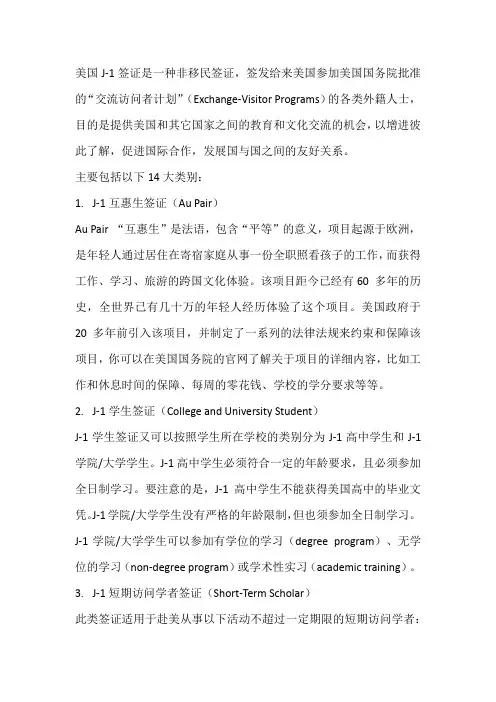
美国J-1签证是一种非移民签证,签发给来美国参加美国国务院批准的“交流访问者计划”(Exchange-Visitor Programs)的各类外籍人士,目的是提供美国和其它国家之间的教育和文化交流的机会,以增进彼此了解,促进国际合作,发展国与国之间的友好关系。
主要包括以下14大类别:1.J-1互惠生签证(Au Pair)Au Pair “互惠生”是法语,包含“平等”的意义,项目起源于欧洲,是年轻人通过居住在寄宿家庭从事一份全职照看孩子的工作,而获得工作、学习、旅游的跨国文化体验。
该项目距今已经有60 多年的历史,全世界已有几十万的年轻人经历体验了这个项目。
美国政府于20 多年前引入该项目,并制定了一系列的法律法规来约束和保障该项目,你可以在美国国务院的官网了解关于项目的详细内容,比如工作和休息时间的保障、每周的零花钱、学校的学分要求等等。
2.J-1学生签证(College and University Student)J-1学生签证又可以按照学生所在学校的类别分为J-1高中学生和J-1学院/大学学生。
J-1高中学生必须符合一定的年龄要求,且必须参加全日制学习。
要注意的是,J-1高中学生不能获得美国高中的毕业文凭。
J-1学院/大学学生没有严格的年龄限制,但也须参加全日制学习。
J-1学院/大学学生可以参加有学位的学习(degree program)、无学位的学习(non-degree program)或学术性实习(academic training)。
3.J-1短期访问学者签证(Short-Term Scholar)此类签证适用于赴美从事以下活动不超过一定期限的短期访问学者:A. 授课;B. 考察(observation);C. 交流意见;D. 接受培训;在研究机构、博物馆、图书馆、高等公认教育机构或类似的机构展示特殊技能。
4.J-1受训人员签证(Trainee)J-1签证受训人员签证适用于从事以下活动的人员:为提高自己专业及非专业上的技能或增进自己对美国先进技术的了解而赴美参加培训;为了更好地理解美国的文化及社会,或为了通过与美国相关人士之间的交流来促进美国对别国文化的了解,赴美参加培训。
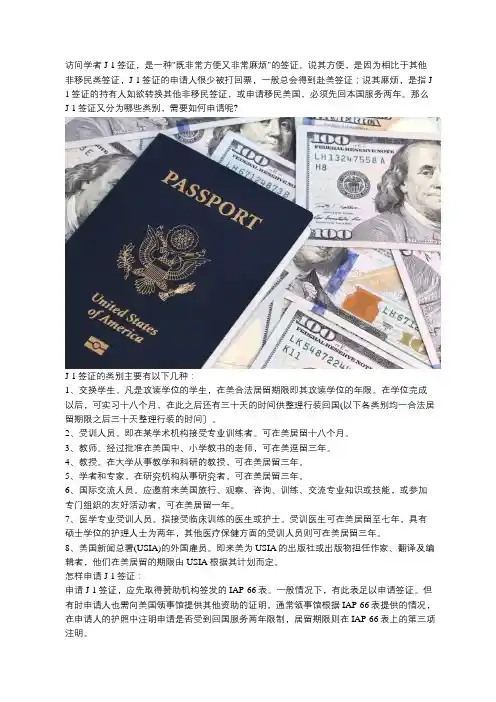
访问学者J-1签证,是一种"既非常方便又非常麻烦"的签证。
说其方便,是因为相比于其他非移民类签证,J-1签证的申请人很少被打回票,一般总会得到赴美签证;说其麻烦,是指J-1签证的持有人如欲转换其他非移民签证,或申请移民美国,必须先回本国服务两年。
那么J-1签证又分为哪些类别,需要如何申请呢?J-1签证的类别主要有以下几种:1、交换学生。
凡是攻读学位的学生,在美合法居留期限即其攻读学位的年限。
在学位完成以后,可实习十八个月,在此之后还有三十天的时间供整理行装回国(以下各类别均一合法居留期限之后三十天整理行装的时间〕。
2、受训人员。
即在某学术机构接受专业训练者。
可在美居留十八个月。
3、教师。
经过批准在美国中、小学教书的老师,可在美逗留三年。
4、教授。
在大学从事教学和科研的教授,可在美居留三年。
5、学者和专家。
在研究机构从事研究者,可在美居留三年。
6、国际交流人员。
应邀前来美国旅行、观察、咨询、训练、交流专业知识或技能,或参加专门组织的友好活动者,可在美居留一年。
7、医学专业受训人员。
指接受临床训练的医生或护士。
受训医生可在美居留至七年,具有硕士学位的护理人士为两年,其他医疗保健方面的受训人员则可在美居留三年。
8、美国新闻总署(USIA)的外国雇员。
即来美为USIA的出版社或出版物担任作家、翻译及编辑者,他们在美居留的期限由USIA根据其计划而定。
怎样申请J-1签证:申请J-1签证,应先取得赞助机构签发的IAP-66表。
一般情况下,有此表足以申请签证。
但有时申请人也需向美国领事馆提供其他资助的证明,通常领事馆根据IAP-66表提供的情况,在申请人的护照中注明申请是否受到回国服务两年限制,居留期限则在IAP-66表上的第三项注明。
保持身份:J-1学生必须全时上课。
不过,并不一定要正式注册,只要资助单位对其学业进展的情况感到满意即可。
研究教学人员则须按照IAP-66表上的说明,从事其研究或教学计划。
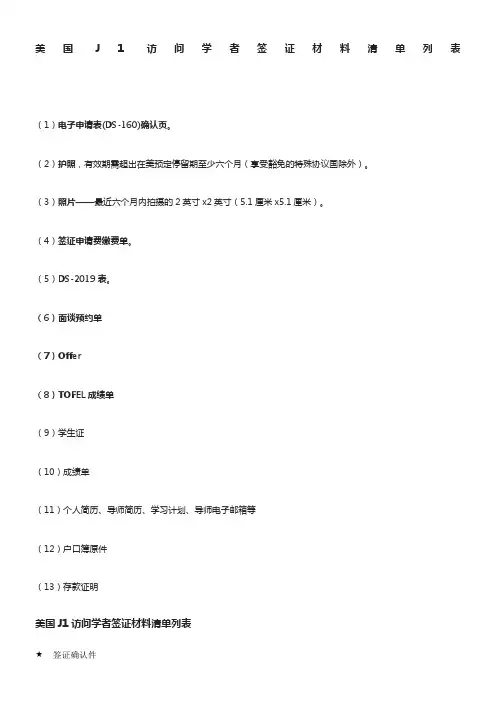
美国J1访问学者签证材料清单列表
(1)电子申请表(DS-160)确认页。
(2)护照,有效期需超出在美预定停留期至少六个月(享受豁免的特殊协议国除外)。
(3)照片——最近六个月内拍摄的2英寸x2英寸(5.1厘米x5.1厘米)。
(4)签证申请费缴费单。
(5)DS-2019表。
(6)面谈预约单
(7)Offer
(8)TOFEL成绩单
(9)学生证
(10)成绩单
(11)个人简历、导师简历、学习计划、导师电子邮箱等
(12)户口簿原件
(13)存款证明
美国J1访问学者签证材料清单列表
签证确认件
☐面谈预约单打印件
☐DS-160确认页打印件
☐SEVIS I-901缴费回执
☐签证费收据
★个人资料
☐所有新旧护照
☐一张签证照片
☐个人英文简历(CV)
★学术性文件
☐签好字的DS-2019表
☐录取通知书
☐美国导师的个人简历
☐留美后的学习/研究计划
☐英文标化考试成绩单和公共考试证书
☐之前/目前学校的学位证和毕业证或在读证明
☐之前(包括目前)学位的中英双语成绩单
★财产证明
☐校方奖助学金证明或国家留学基金委奖学金证明(如有)
☐资金资助人财产证明
☐与资助人的关系证明
☐固定资产证明
若申请人有家属陪同赴美(即申请J2签证)请同事提供自己与配偶或/和子女的关系证明,例如结婚证、出生证、户口本等。
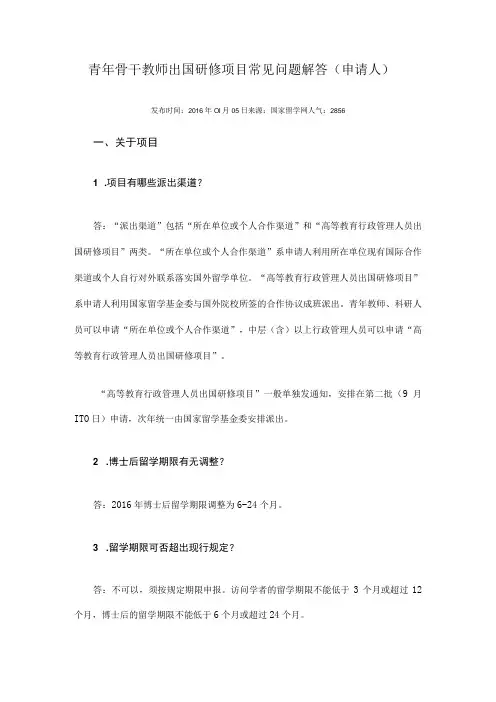
青年骨干教师出国研修项目常见问题解答(申请人)发布时间:2016年Ol月05日来源:国家留学网人气:2856一、关于项目1 .项目有哪些派出渠道?答:“派出渠道”包括“所在单位或个人合作渠道”和“高等教育行政管理人员出国研修项目”两类。
“所在单位或个人合作渠道”系申请人利用所在单位现有国际合作渠道或个人自行对外联系落实国外留学单位。
“高等教育行政管理人员出国研修项目”系申请人利用国家留学基金委与国外院校所签的合作协议成班派出。
青年教师、科研人员可以申请“所在单位或个人合作渠道”,中层(含)以上行政管理人员可以申请“高等教育行政管理人员出国研修项目”。
“高等教育行政管理人员出国研修项目”一般单独发通知,安排在第二批(9月ITO日)申请,次年统一由国家留学基金委安排派出。
2 .博士后留学期限有无调整?答:2016年博士后留学期限调整为6-24个月。
3 .留学期限可否超出现行规定?答:不可以,须按规定期限申报。
访问学者的留学期限不能低于3个月或超过12个月,博士后的留学期限不能低于6个月或超过24个月。
4 .留学单位可否为香港、澳门、台湾地区的高校科研院所?答:不可以。
5 .国家公派留学人员奖学金资助的主要内容是什么?答:资助内容包括一次往返国际旅费和资助期限内的奖学金(包括伙食费、住宿费、注册费、交通费、电话费、书籍资料费、医疗保险费、交际费、一次性安置费、签证延长费、零用费和学术活动补助费等)。
奖学金资助标准及方式按照国家现行有关规定执行。
6 .是否提供学费资助?答:不提供任何形式的学费资助。
7 .国外留学单位要求收取注册费可否予以报销?答:赴英国留学的访问学者可申请报销IoOo英镑以内的BenehFee,具体可咨询驻英国使(领)馆教育处(组)。
赴其他国家的高级研究学者、访问学者、博士后不予报销。
8 .选派工作时间有什么变化?答:2016年青年骨干教师出国研修项目第一批申报时间调整为4月1-15H,5月公布录取结果;第二批申报时间与2015年第二批一致,即9月1-10日申报,10月公布录取结果。
最权威的国际教育服务平台资料来源:教育优选 /2015年后到美国做访问学者语言成绩什么时候要? 厚谱教育:美国国务院公布,自2015年1月5日起,访问学者在申请DS2019表格时需提交一份语言证明材料。
厚谱教育资深专家周雅淇老师更深解读:从2015年之后,每一位想要到美国做访问学者的人,在申请DS2019表格时,必须提交一份语言证明材料,这份证明材料可以以雅思、托福等国际语言能力考试成绩证明,也可以向申请者所要访学的学术机构或者相应导师索要,让他们帮你开具一份可以证明在进行学术交流上能良好沟通的语言证明材料。
虽然美国在2015年1月5日起才实施这项政策,很多人认为政策刚刚公布,也许会有一段缓冲期,不会太过严格要求,这种想法显然是不对的。
美国对访学者语言成绩证明的政策可能更加细化、扩大化但是,周老师告诉大家:政策一经公布,美国的顶尖大学肯定会响应这一政策,而且有的学校响应政策的速度堪比神速,就厚谱教育所知如埃默里、北卡等高校已事前公布了最低分数要求,厚谱教育专家从埃默里大学官网看到,如果访问学者需要提供英语考试成绩的话,该校要求其托福最低79分,雅思最低6分,这相当于一个合格成绩。
我们应该相信,这项政策一经实施,美国各校都会出台自己的语言要求标准。
届时,厚谱教育会为大家详细整理相关信息,让广大想要赴美做访问学者的人,有一个良好参考。
语言成绩证明最好在访学之初就获得所以,在以后的时间里,希望申请者最好能够通过各种渠道能获取一份这样的证明。
我们厚谱教育专注访学十余载,积累了丰富的经验和各种访学申请技巧,无论相关政策如何变动,我们都会及时研讨、总结出第一手有助于访学申请者的方法或技巧!在此,厚谱教育与众多申请访问学者共勉,我们不要把访学语言证明材料看的多么的难以攀越,厚谱教育会一路为您的梦想保驾护航,做您访学路上的一颗指路明灯。
浙江省教育厅办公室关于做好2019年浙江省高校优秀中青年骨干教师出国研修项目的通知文章属性•【制定机关】浙江省教育厅办公室•【公布日期】2019.03.13•【字号】浙教办函〔2019〕64号•【施行日期】2019.03.13•【效力等级】地方规范性文件•【时效性】现行有效•【主题分类】职业能力建设正文浙江省教育厅办公室关于做好2019年浙江省高校优秀中青年骨干教师出国研修项目的通知浙教办函〔2019〕64号各高等学校:在各高校的共同努力下,省教育厅与国家留学基金管理委员会(以下简称国家留学基金委)共同实施的地方合作项目——“浙江省高校优秀中青年骨干教师出国研修项目”已执行9年,共录取1456名教师出国研修,覆盖面越来越广,项目影响力逐渐增强,受到了各校和教师的普遍欢迎。
经与国家留学基金委协商,2019年我省将继续实施地方合作项目。
现将有关事项通知如下。
一、指导思想以习近平新时代中国特色社会主义思想和党的十九大精神为指导,以服务国家和浙江经济社会发展大局为导向,以推进浙江教育现代化为统领,按照省委办公厅、省政府办公厅印发的《关于做好新时期教育对外开放工作的实施意见》和省发展改革委、省教育厅印发的《浙江省教育事业发展“十三五”规划》确定的目标,通过实施地方合作项目,选派我省高校骨干教师出国研修,借鉴国外先进教育理念和有益教育经验,学习国际前沿理论,提高我省高校骨干教师的一线教学能力和整体学术水平,培养国际化人才,更好地服务浙江经济社会发展,为浙江“两个高水平”建设贡献力量。
二、选派计划2019年计划选派200人,其中理工农医类120人,人文社科类80人。
三、选派类别及留学期限(一)高级研究学者:留学期限3—6个月;(二)访问学者:留学期限6个月或12个月。
四、选派学科专业紧密围绕浙江“十三五”着力培育的信息、环保、健康、旅游、时尚、金融、高端装备制造、文化创意等八大万亿产业和人工智能、新能源等战略性新兴产业的发展需要,确定相关重点选派专业。
到美国做访问学者的一般程序如果您是博士后,一般应当申请到国外也做博士后,或访问学者。
这里把到美国做访问学者的一般程序载录如下,供您参考。
J-1签证:J-1签证是交换人员签证, Exchange Visitor Visas.J-1签证的特许权利:1.可以去美国参加由美国新闻署 (United States Information Agency批准的人员交流计划.学生,教师,科研人员,商业和政务培训人员,以及其他文化访问者,都可以参加这种交流计划.2.如果工作是交流计划的部分内容,或者你得到交流计划赞助部门的官员的特别批准,你可以在美国合法的工作.3.随行的家庭成员也可以得到签证.4.随行的家庭成员如果得到移民局的特别许可,也可以在美国工作.J-1签证批准的条件:1.你必须被美国的一个交流计划接受2.这个交流计划必须被美国新闻署批准3.你必须有足够的经济来源或赞助支付在美国期间的所有费用4.你必须有必要的英语能力有效的执行和完成交流计划中你承担的任务.5.你必须确实准备在签证期满后返回本国.J-1签证申请需要提交的文件及相关手续:申请J-1签证,你必须提交两类文件.第一类是由交流计划主办单位(美国方填写的正式表格和相关文件.第二类是你自己的个人文件,包括证明你已被一个交流计划接纳和经济来源或资助等证明文件.主要文件包括:1.IAP-66表格IAP-66表格由美国方交流计划单位提供,并负责填写,然后寄给签证申请者.申请者本人不用填写和签字.申请者用此表连同其他文件向使领馆提出签证申请.获得签证时,使领馆会把IAP-66表退还申请者,同时在该表上附有加注.2.OF-156表即非移民签证申请表.与申请F类等签证的相同.表中问题根据实际情况回答.3.护照和护照用照片.4.证明你会在签证期满后回国的有关文件,如配偶/子女/不动产等证明文件.5.经济证明文件.证明你有足够的经济来源支付你在美国期间的所有费用.第一,需要合格的TOFEL或IELTS 成绩。
J1交流访问学者签证受理时间美国使馆正常受理时间通常情况下为面试后3-5个工作日,美国签证需提前预约面试时间,通常为提前一个月.旺季的时候请提前2-3个月;J1交流访问学者签证“J”交流访问学者计划旨在促进在教育、艺术和科学领域内人员的知识和技术交流。
参加者包括各大、中、小学在校学生;参加公司、机构和办事处在职培训的人员;各小学、中学和专业技术学校的教师...,以及以研究培训和示范专业知识或技能为目的的访问学者。
J1交流访问学者签证与材料“J”交流访问学者计划旨在促进在教育、艺术和科学领域内人员的知识和技术交流。
参加者包括各大、中、小学在校学生;参加公司、机构和办事处在职培训的人员;各小学、中学和专业技术学校的教师;赴高等教育机构任教或从事研究工作的教授,从事研究工作的学者;赴医疗机构进行专业培训的人员;以及以研究培训和示范专业知识或技能为目的的访问学者。
“J”交流访问者必须有足够的学术准备和英语语言知识以保证申请人在接收其的教育机构或其他研究机构进行整个过程的学习。
如果申请人的英文水平不足以让其完成整个学业。
学院须出具文件证明为其安排特殊培训以提高其英语水平。
按照“J”交流访问学者计划参加医学专业本科学习和培训的人员必须符合以下几项特殊的规定。
其中包括:必须已经通过外国医学专业生考试。
证明有足够的英语语言知识;必须在完成交流项目后回国居住两年,必须计划在美国停留的期限到达后离开。
作为访问学者赴美进行考察咨询,教学或研究而不行医的医生不受上述条件的限制。
必备的材料:1. 填妥的DS-156、DS-157和DS-158申请表2. 在中信实业银行交纳签证申请费的收据3. 有效的护照。
该护照有效期必须比申请计划在美国停留的时间多至少9个月。
4. 两张最近的美国护照相片“J”申请人必须出示已填妥的由美方赞助单位或邀请机构发的DS-2019表。
“Q”签证的申请人需要一份批准书I-797表。
参加“Q”交流访问计划的人员需要有由美国国土安全部批准并由担保方出具的非移民工作批准书I-129表。
美国交流访问学者签证(J类签证)申请材料介绍第一篇:美国交流访问学者签证(J类签证)申请材料介绍美国交流访问学者签证(J类签证)申请材料介绍“J” 交流访问学者签证旨在促进教育、艺术和科学领域内人员的知识和技术交流。
参加者包括各大、中、小学在校学生;参加各公司、机构和办事处在职培训的人员、各小学、中学和专业技术学校的教师、赴高等教育机构任教或从事研究工作的教授、专门从事研究工作的学者、赴医疗或相关机构进行专业培训的人员以及赴美进行下列活动的国际知名访问学者:旅行、观测、咨询、研究、培训、分享或示范专业知识或技能、参加有组织的个人对个人交流项目。
J1和J2签证申请人在其交流项目开始之前的任何时间都可以被签发签证,因此使馆建议J签证申请人尽早提出申请,以便预留足够时间进行必要的签证审理程序。
但交流访问学者签证的持有者只能比项目初始日期提前30天或更少天数入境美国。
返美继续同一交流项目的申请人不受此限制。
所有J类签证申请人都应该提前做好准备, 以便能够在面谈时出示下列材料和其它任何与签证申请有关的支持材料:有效护照:如果您的护照将在距您预计抵美日期的六个月内过期、或已损坏、或护照上已无空白的签证签发页, 请在前来面谈之前先申请一本新护照。
一张照片:于6个月内拍摄的5X5厘米正方形白色背景的彩色正面照。
请将照片用胶水粘贴在DS-156电子签证申请表上。
详情请见照片要求。
签证申请费收据原件: 您可以在中信银行在中国的任何分行支付签证申请费904元人民币(自2008年7月24日起执行)。
非移民签证申请人现在将DS-156电子签证申请表填写完毕并打印出来后,必须将其申请费收据粘贴于表格的最后一页上。
请注意粘贴收据时不要将条形码区域遮挡住,另外请勿用订书钉或胶水(胶棒)粘贴收据。
填写完毕的签证申请表格: DS-156、DS-157和DS-158非移民签证申请表。
填写完整的 DS-2019表:表格上的姓名必须与您护照上的姓名完全一致,并已被美国的学术机构输入学生和交流访问学者信息系统(SEVIS)。
美国访学新规定英语美国访学新规定英语美国教育部关于访问学者J1身份的新规定从2015年1月5日开始执行“Objective Measurement” of English Language Proficiency Current regulations require that a prospective exchange visitor “possess sufficient proficiency in the English language to participate in the program,” however, the level of English proficiency was not specified, nor was the means to determine that sufficient proficiency was attained. The Department of State changed this rule because "too many exchange visitors lack sufficient English proficiency to perform their jobs or complete their academic programs; to navigate daily life in the United States; to read and comprehend program materials; to understand fully their responsibilities, rights, and protections; and to know how to obtain assistance, if necessary." [79 FR 60294, 60301]”The new rules now require "sufficient proficiency in the English language, as determined by an objective measurement of English language proficiency, successfully to participate in his or her program and to function on a day-to-day basis." [22 CFR 62.11(a)(2)]To comply with this provision proof of English proficiency will need to be provided thoughA recognized English language testSigned documentation from an academic institution or language school; orA documented interview conducted by the sponsor either in-person or by videoconferencing, or by telephone ifvideoconferencing is not a viable optionThe Department of State "reminds sponsors to retain e vidence of how they measured applicants’ English language proficiency so that it may be made available to the Department upon request." Examples of recognized English language tests include TOEFL, IELTS, TOEIC or the Michigan Test. Additional details about acceptable documentation of English proficiency and ways to document interviews via videoconferencing will be forthcoming.[美国访学新规定英语]。
美国教育部关于访问学者J1身份的新规定
从2015年1月5日开始执行
“Objective Measurement” of English Language Proficiency
Current regulations require that a prospective exchange visitor “possess sufficient proficiency in the English language to participate in the program,” however, the level of English proficiency was not specified, nor was the means to determine that sufficient proficiency was attained. The Department of State changed this rule because "too many exchange visitors lack sufficient English proficiency to perform their jobs or complete their academic programs; to navigate daily life in the United States; to read and comprehend program materials; to understand fully their responsibilities, rights, and protections; and to know how to obtain assistance, if necessary." [79 FR 60294, 60301]”
The new rules now require "sufficient proficiency in the English language, as determined by an objective measurement of English language proficiency, successfully to participate in his or her program and to function on a day-to-day basis." [22 CFR 62.11(a)(2)]
To comply with this provision proof of English proficiency will need to be provided though
• A recognized English language test
•Signed documentation from an academic institution or language school; or
• A documented interview conducted by the sponsor either in-person or by videoconferencing, or by telephone if videoconferencing is not a viable option
The Department of State "reminds sponsors to retain evidence of how they measured applicants’ English language proficiency so that it may be made available to the Department upon request." Examples of recognized English language tests include TOEFL, IELTS, TOEIC or the Michigan Test. Additional details about acceptable documentation of English proficiency and ways to document interviews via videoconferencing will be forthcoming.。